Following hard on the heels of the news of the vocations website in Australia, Fr. Eric Bergman has reported the following in the February newsletter of St. Thomas More Parish, Scranton, PA:
Less than a week ago my family and I returned from our trip half-way across the country to Houston, Texas, where we witnessed William Cardinal Levada, Prefect Emeritus of the Congregation for the Doctrine of thea Faith, dedicate and bless the new Chancery for the Personal Ordinariate of the Chair of St. Peter. The building is both large and beautiful, and it will house the Ordinariate offices, … a conference room, a great hall, an oratory for the celebration of private Masses, and an enclosed courtyard that is perfect as a silent retreat in the middle of one of America’s largest cities.
Most importantly, to my mind, however, it also will host the Ordinariate’s House of Anglican Studies, wherein the men that our parishes raise up with vocations to the diaconate and priesthood will receive formation in our liturgical and spiritual heritage. That is, the Ordinariate is already preparing to educate and form for our brand new jurisdiction the next generation of clergy, who will live and learn alongside other Latin Rite students from dioceses across the United States at St. Mary’s Seminary, just two miles away from our Chancery.
The weekend there was an affirmation of both our mission and the growth the Ordinariate is experiencing, and at the same time it highlighted how our parishes and our expression of the Roman Rite Mass are now permanent fixtures in the Catholic Church.
With the future health of these missionary parishes in mind, we must always have an eye towards vocations. Just this week I contacted the Vocations Director of the Ordinariate on behalf of two men in our parish with whom I have been working for well over a year, as they discern God’s call for them in the Church. I ask your prayers for Jack Grimes and
Corey Comstock, who have both sensed the Lord calling them to ordained ministry. There is no guarantee that this is true, as one’s vocation must always be discerned within the context of the mind and heart of the Church. But they are ready to begin with our Vocations Director the formal process of determining whether God is indeed the source of the call they sense, so we must pray with them that in this, as in all things, God’s will be done. Please mention them by name in your daily devotions, and I will keep you apprised of how their discernment progresses.
As I look back thirty years or more I can tell you that I began to sense my own vocation
to the priesthood while serving in the sanctuary of the Episcopal parish in which I was
raised. I was an altar boy and sang in our church choir. Later I was asked to train the
altar servers and was appointed the verger, essentially a glorified sexton with a spot in
the procession each Sunday. Not every boy who serves at the altar will become a priest, as I and so many of my colleagues did, but we have long recognized that service on the altar is often a precursor to entrance at the seminary. Therefore, to aid in raising up vocations to the ordained ministry we would like to foster the growth of our corps of altar servers, while improving and expanding upon the training they receive. In addition, related to this effort, some of the men of our parish will become Instituted Acolytes, a position that is not necessarily a prelude to ordination, but which will allow them to serve in certain liturgical roles, for example, when we offer a Solemn High Mass.
Thus, I hope these potential vocations we have in Corey and Jack are the beginning of a trend at St. Thomas More Parish and that in the coming years many more men will approach me about beginning the discernment process.
To expand our corps and improve our training we will begin offering Saturday evening sessions once a month that will include worship, dinner, instruction, fellowship, and, on occasion, recreation. These sessions, to begin at 6PM in the church on the second
Saturday of every month, will be open to all men and boys of the parish who have received at least their First Holy Communion and wish to serve on the altar. While monthly instruction will be required of all the boys, attendance for our adult servers will be encouraged though not mandatory once they have completed their training. Our goal is to instill a sense of reverence and discipline, without neglecting to nurture the camaraderie that naturally develops whenever a group of men work together toward the fulfillment of a common goal, in this case service to the glory of God in the Holy Sacrifice of the Mass. Ray Nearhood, Jr. and my brother, David, have graciously agreed to help me in this new endeavor, but be assured I intend to be present every month. Please speak with me if you would like to register as a new trainee. May the altar service of the parish’s boys help them to consider that perhaps they themselves have a vocation to the ordained ministry.
Happy to be back home with you, with prayers for a fruitful season of penitence and
fasting for you and yours, and grateful for the many ways you serve the Church, I am,
Your Servant in Christ,
The Rev. Eric L. Bergman

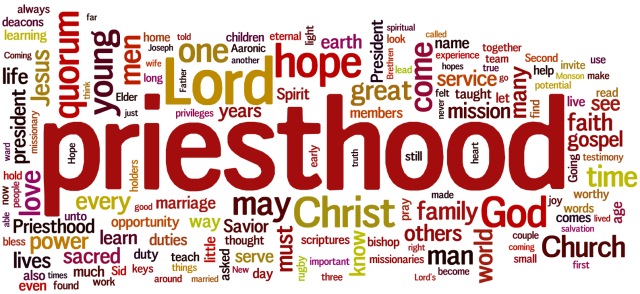



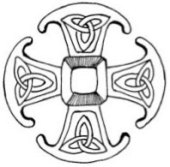
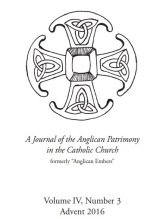

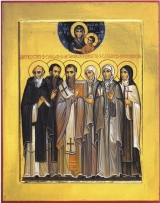
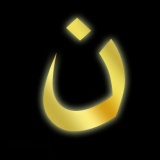


Well, it seems you no longer need to worry about the Chancery being underused, EPMS.
Furthermore, I didn’t realise that it was so close to the local seminary. It’s certainly a great advantage.
The tradition of men who are already married being called to and ordained to the priesthood is certainly a well-founded part of Anglican patrimony (and Orthodox patrimony, too). Is there any discussion on whether this will be something possible in the Ordinariate (and I’m not talking about ordained ministers who become Catholic and then receive Catholic Orders).
Anglicanorum Coetibus and its complementary norms state that the Ordinariates will conform to the Latin Rite in havimg a celibate priesthood, although married men may be admitted on a “case by case” basis. It remains to be seen how generously or otherwise dispensations are granted for married men who have never been ordained ministers.
duanemiller,
You asked: Is there any discussion on whether this will be something possible in the Ordinariate (and I’m not talking about ordained ministers who become Catholic and then receive Catholic Orders).
The reply from EPMS regarding the provisions of Anglicanorum coetibus and the associated “complementary norms” is substantially correct. These documents give a definite indication that the Vatican would prefer that candidates for ordination coming from within the ordinariates be celibate while recognizing the reality that it might not be practicable to insist upon it.
More recently, however, I saw an article indicating that Pope Francis said that he is not only open to a relaxation of the discipline of celibacy, but determined to make it happen. Nevertheless, the Vatican seems to want the initiative on this to come up from below rather than down from above — meaning the episcopal conferences would initiate the change. There are practical issues, to be sure — (1) the need to realign diocesan budgets to provide decent compensation for married clergy and (2) the need to reconfigure rectories built to provide suites for celibate clergy to provide a suitable arrangement for married couples with children. These changes won’t happen overnight.
Norm.
It is not entirely clear from Fr Bergman’s syntax whether future Ordinariate postulants will “live and work alongside other Latin Rite students…at St Mary’s Seminary” or study at the Chancery House of Anglican Studies. Perhaps both. In any event the tone of Fr Bergman’s message is that, going forward, the OCSP will be looking for young men with a celibate vocation to gradually replace the current crop of former Anglican clergy. This would certainly alleviate the problems with clergy mobility.
EPMS,
You wrote: In any event the tone of Fr Bergman’s message is that, going forward, the OCSP will be looking for young men with a celibate vocation to gradually replace the current crop of former Anglican clergy. This would certainly alleviate the problems with clergy mobility.
Well, yes and no. Looking for young men with a celibate vocation seems to be the practical necessity of the present moment.
But the extent to which celibacy will “alleviate the problems with clergy mobility” is not so clear. There’s a big difference between moving to a new parish on the other side of a diocese, perhaps three or four hours away, and moving across the country, a couple thousand miles away. In the former case, a presbyter can make several trips to transport his belongings and can return pretty easily to tie up loose ends or, if necessary, begin ministering in his new assignment several weeks before he actually moves. In the latter case, multiple trips are out of the question so there’s likely a need for a moving van and several days off to drive his personal vehicle to his new assignment. Transfers of clergy among nearby congregations, however, could be considerably easier with a celibate clergy.
Norm.
If the priests in question have already had to relocate to a seminary in Houston for their formation they should have grasped the idea that there is a downside to an Ordinariate which takes in an entire continent.
EPMS,
You wrote: If the priests in question have already had to relocate to a seminary in Houston for their formation they should have grasped the idea that there is a downside to an Ordinariate which takes in an entire continent.
None of the ordinariate’s clergy have had to relocate to Houston so far. All of the formation for those ordained in the Anglican Communion or in various “continuing Anglican” bodies has been done primarily by remote learning (Internet and correspondence courses, etc.) and a few seminars that involved travel for only a few days.
In the larger picture, seminary is essentially graduate school — and in many fields of study, students often have to relocate to go to a graduate school that offers the programs that they seek. Of course, this typically happens when people are still single or newly married, so any children have not yet reached school age and relocation is both (1) incorporated in a couple’s plans for life together after the wedding and (2) even a relocation after completion of a graduate degree is not so disruptive on the family as a whole. When — and it now appears safe to say “when” rather than “if” on this matter — the ordinariates start accepting married candidates from within their own ranks as seminarians, the situation of the married seminarians won’t be any different.
Here, I should also point out that the establishment of a “house of formation” on the ordinariate’s new chancery does not obligate the ordinariate to send its seminarians to St. Mary’s Seminary in Houston. I have no doubt that the present ordinary has decided to send the majority of his seminarians there because he is on the faculty, and thus can oversee their formation, but the next ordinary may make a different decision in this regard.
Norm.
Further to the topic, the latest OLW Church Bulletin brings the following information:
“To Rome for Discernment!
This March, a group of eight high school classmates will make a pilgrimage to the Eternal City, Rome, for the purpose of discerning a call to the priesthood. Accompanying them will be three adult guides including OLW parishioner, Tommy Romano.”
Click to access 20150215.pdf
God willing, there will be no shortage of priests in the US Ordinariate even if there are fewer convert clerics in the future.
I just want to add that the well of married clergy from the Episcopal Church USA & Anglican Church of Canada may be far from dry. The final toll isn’t over what with some holding out to see if their respective jurisdictions can reverse themselves as unlikely as that is, then we shall see who may come home.
Did the “House of Anglican Studies” mentioned here become a reality? I was taken to this post by a link underneath the report on the Acolyte Training Weekend.